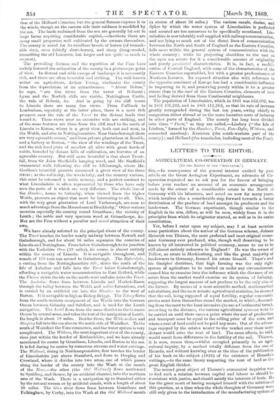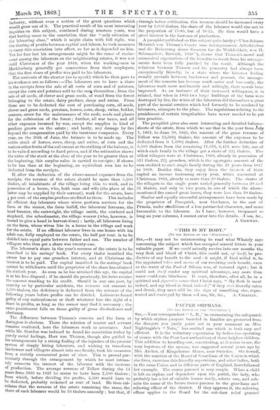LETTERS TO THE EDITOR .
AGRICULTURAL CO-OPERATION IN GERMANY.
[TO THE EDITOR OF THE " SPECTATOR."]
SIR, —In consequence of the general interest excited by your article on the Great Assington Experiment, an advocate of Cooperation requested me to ask you for the favour of bringing before your readers* an account of an economic arrangement made by the owner of a considerable estate in the North of Germany with his labourers, and acted on now for many years, which involves also a considerable step forward towards a better distribution of the produce of land amongst its producers and the landowner. The German experiment, though similar to the English in its aim, differs, as will be seen, widely from it in the principles from which its originator started, as well as in its entire constitution.
Yet, before I enter upon my subject, may I at least mention some particulars about the author of the German scheme, Johann Heinrich von Thiinen, the most profound and most original economist Germany ever produced, who, though well deserving to be known by all interested in political economy, seems to me to be still almost entirely unknown in England ? He was the owner of Tellow, an estate in Mecklenburg, and like the great majority of landowners in Germany, farmed his estate himself. Thaer's and his disciples' doctrines, that high farming was the only right system of agriculture to be carried on under any circumstance=, caused him to examine into the influence which the distance of an estate from the market would exercise on its system of farming, supposing the largest amount of net produce to be the only aim of the farmer. By means of a most scientific method, mathematical calculations, and the most minute agricultural statistics, he showed that the soil, being supposed of equal fertility, regular concentric circles must form themselves round the market, in which, descending from the most to the least intensive (to use a Continental term), according to the distance, the various agricultural systems were to be carried on until there came a point where the cost of production and transport must be equal to the selling price of the corn, and where a rent of land could not be paid any more. Out of the advantage enjoyed by the estates nearer to the market over those more distant would arise the rent of land. The same effects, he said, would result from differences in the fertility of the soil. Thiinen, it is seen, comes thus,—whilst occupied primarily in an agricultural inquiry, by a method totally different from the one of Ricardo, and without knowing even at the time of the publication of his book on the subject (1826) of the existence of Ricardo s writings,—to the same theory respecting the rent of land as the great English thinker.
The second great object of Thiinen's economical inquiries was to find such a relation between capital and labour as should be consistent with justice, and should satisfy the interests of both. He has the great merit of having occupied himself with the solution d this question, at a time when the whole thoughts of Germany were I still only given to the introduction of the manufacturing system of industry, without even a notion of the great questions which would grow out of it. The practical result of his most interesting inquiries on this subject, continued during nineteen years, was that having come to the conviction that the " only salvation of the labouring class," which it might claim with full right, was the sharing of profits between capital and labour, he took measures to carry this conviction into effect, so far as it depended on him. Yet for fear lest his arrangements might be the cause of excitement among the labourers on the neighbouring estates, it was not until Christmas of the year 1848, when the working-men in Afecklenburg generally got concessions from their employers, that the first share of profits was paid to his labourers.
The contents of the charter (so to speak) which he then gave to his workmen are as follows :—The labourers are to have a share in the receipts from the sale of all sorts of corn and of potatoes, except the corn and potatoes sold to the meg themselves ; from the sale of oil seeds, of clover and grass seeds, of wood from the forest belonging to the estate, dairy produce, sheep and swine. From these are to be deducted the cost of purchasing corn, oil seeds, clover and grass seeds, potatoes, horses, cows, sheep, swine, fodder, manure, straw for the maintenance of the roofs, seeds and plants for the cultivation of the forest ; further, all war taxes, and all other expenses incurred by war, except the supplies in kind of produce grown on the estate ; and lastly, any damage by fire beyond the compensation paid by the insurance companies. Every year, on the 30th of June, the balance is to be made up. The entire stock of horses, cows, sheep, and swine, of corn and the various other fruits of the soil extant at the striking of the balance, is to be valued according to fixed prices, and if the estimation shows the value of the stock at the close of the year to be greater than at the beginning, this surplus value is carried to receipts; if shown to be less than at the beginning, an equivalent sum has to be deducted from the receipts.
If, after the deduction of the above-named expenses from the receipts, the revenue of the estate should be more than 5,500 thalers, all inhabitants of the village being able to work, and in possession of a house, who, both man and wife (the place of the latter may be supplied by their servant), work for the estate, have j per cent. of the surplus produce credited to them. This includes all efficient day labourers whose wives perform services for the farm or the manor, the farm bailiff, the labourers' foreman, the head forester, the cartwright, the village smith, the cowherd and shepherd, the schoolmaster, the village weaver (who, however, is bound to give a hand in harvest-time) ; lastly, all labourers living on the farm, whose wives live in a house in the village and work for the estate. If an efficient labourer lives in one house with his adult son, fully employed on the estate, the half per cent. is to be divided into equal parts between father and son. The number of villagers who thus got a share was twenty-one.
The labourer's share in the year's revenue of the estate is to be inscribed in his savings' book. For every thaler inscribed the owner has to pay one groschen interest, and at Christmas the interest is to be paid. The capital inscribed in the savings' book cannot be withdrawn until the proprietor of the share has attained his sixtieth year. As soon as he has attained this age, the capital is at his free disposal ; if he should die previously, his heirs receive the amount standing to his credit. Should in any one year, by scarcity or by particular accidents, the revenue not amount to 5,500 thalers, the deficiency is deducted from the revenue of the following years before profits can be divided. Labourers found guilty of any embezzlement or theft whatever lose the right of a share in profits, as long as the owner may find it necessary ; the same punishment falls on those guilty of gross disobedience and obstinacy.
The difference between Thiinen's concern and the farm at Assington is obvious. There the relation of master and servant remains unaltered, here the labourers work as associates. And while Mr. Gurdon was induced to found his association rather by purely social feelings, Herr von Thiinen, though also guided to his arrangements by a strong feeling of the injustice of the present system of simply hiring labourers, and wishing to transform landowner and villagers almost into one family, took his measures from a strictly economical point of view. This is proved par ticularly through the arrangement by which he most intimately connects the interest of the labourer with the increase of production. The average revenue of Tellow during the 14 years from 1833 to 1847 he states to have been 7,500 dialers ; from which, before dividing the profits, 5,500 would have to be deducted, probably reckoned as rent of land. He then calculates that the revenue of the estate remaining the same, the share of each labourer would be 10 thalers annually ; but that, if through better cultivation, this revenue should be increased every year by 1,000 thalers, the share of the labourer would rise not in the proportion of 75-85, but of 10-15. He thus would have a great interest in the increase of production.
A pamphlet published on this subject quite lately (" Mier Johann Heinrich von Thiinen's Gesetz von' naturgemassen Arbeitslohne and die Bedeutung dieses Cesetzes fiir die Wirklichkeit, von 11. Schumacher ; Rostock, 1869 "), shows that Thiinen's moral and economical expectations of the benefits to result from his arrangements have been fully justified by the result. Although the relations between Thiinen and his peasantry had always been exceptionally friendly, in a state where the bitterest feeling usually prevails between landowner and peasant, the management of the concern has become much easier and less costly, the labourers work more assiduously and willingly, their morals have improved. As an instance of their increased willingness, it is related, that when in 1865 two large buildings of the farm were destroyed by fire, the wives of the labourers did themselves a great part of the menial services which had formerly to be rendered by labourers, strangers to the place. The regulations relating to the punishment of certain irregularities have never needed to be put into practice.
The pamphlet gives also most interesting and detailed balance
sheets of the estate, from which we see that in the year from July 1, 1864, to June 30, 1865, the amount of the gross revenue of Tellow was 13,584} thalers, the amount of the expenses to be deducted from it 1,608j thalers. After the further deduction of 5,500 thalers from the remaining 11,976, 6,476 were left, out of which each family in the village got a share of 32} thalers. The oldest villagers were at Christmas, 1868, already in possession of 511 thalers, 22} groscheu, which is the aggregate amount of the sum credited to each single family during the 21 years from 1847 to 1868. Besides this, they enjoy from the interest of their capital an income increasing every year, which amounted at Christmas, 1868, already to more than 20 thalers. The shares of the villagers in the single years varied generally between 20 and 51 thalers, and only in two years, in one of which the abovementioned fire caused great losses, they were less than 10 thalers.
Similar and equally successful arrangements have been made by the proprietor of Poseguick, near Gerdauen, in the east of Prussia, under clknditions of a. less patriarchal character, and more favourable to the labourer. As I have, however, trespassed so long on your columns, I cannot enter into the details,-1 am, &c., A GERMAN.



































 Previous page
Previous page